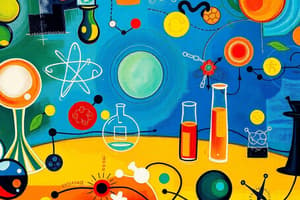Podcast
Questions and Answers
বিজ্ঞান কি ধরনের একটি উদ্যোগ?
বিজ্ঞান কি ধরনের একটি উদ্যোগ?
- পার্থিব ঘটনাবলি সম্পর্কিত দস্তাবেজ তৈরি
- বুদ্ধিবৃত্তিক গবেষণায় নিবেদিত
- পরীক্ষাযোগ্য ব্যাখ্যা ও পূর্বাভাস তৈরি করা (correct)
- সংগঠন ও পরিকল্পনা নিয়ে কাজ করা
কোনটি প্রাকৃতিক বিজ্ঞানের একটি শাখা নয়?
কোনটি প্রাকৃতিক বিজ্ঞানের একটি শাখা নয়?
- জীববিজ্ঞান
- গাণিতিক লজিক (correct)
- রসায়ন
- পদার্থবিজ্ঞান
এটি নিয়ে আলোচনা করে যে মানব আচরণ এবং সমাজের গবেষণা কোন শাখায় আসে?
এটি নিয়ে আলোচনা করে যে মানব আচরণ এবং সমাজের গবেষণা কোন শাখায় আসে?
- প্রযুক্তি বিজ্ঞান
- প্রাকৃতিক বিজ্ঞান
- সামাজিক বিজ্ঞান (correct)
- অর্থনীতি
বৈজ্ঞানিক পদ্ধতির কোন পদক্ষেপে প্রশ্ন তৈরি করা হয়?
বৈজ্ঞানিক পদ্ধতির কোন পদক্ষেপে প্রশ্ন তৈরি করা হয়?
একটি বৈজ্ঞানিক পরীক্ষায় পরিবর্তনশীল হিসেবে যেটি মাপা হয় সেটা কী?
একটি বৈজ্ঞানিক পরীক্ষায় পরিবর্তনশীল হিসেবে যেটি মাপা হয় সেটা কী?
বিজ্ঞান গবেষণার জন্য নৈতিক দায়িত্ব কি?
বিজ্ঞান গবেষণার জন্য নৈতিক দায়িত্ব কি?
বিজ্ঞান কতটি ক্ষেত্রকে একত্রিত করে নতুন প্রবণতাগুলো কি?
বিজ্ঞান কতটি ক্ষেত্রকে একত্রিত করে নতুন প্রবণতাগুলো কি?
বিজ্ঞান কি কারণে প্রযুক্তিগত উদ্ভাবন এবং উন্নতি উত্সাহিত করে?
বিজ্ঞান কি কারণে প্রযুক্তিগত উদ্ভাবন এবং উন্নতি উত্সাহিত করে?
Flashcards are hidden until you start studying
Study Notes
Definition of Science
- Systematic enterprise that builds and organizes knowledge in the form of testable explanations and predictions about the universe.
Branches of Science
- Natural Sciences: Study of natural phenomena.
- Physics: Study of matter, energy, and their interactions.
- Chemistry: Study of substances, their properties, and reactions.
- Biology: Study of living organisms and life processes.
- Formal Sciences: Study of formal systems.
- Mathematics: Study of numbers, quantities, and shapes.
- Logic: Study of reasoning.
- Computer Science: Study of algorithms and data structures.
- Social Sciences: Study of human behavior and societies.
- Psychology: Study of the mind and behavior.
- Sociology: Study of social behavior and structures.
- Economics: Study of production, consumption, and transfer of wealth.
Scientific Method
- Observation: Gathering data through senses or instruments.
- Question: Formulating a question based on observations.
- Hypothesis: Proposing an explanation or prediction that can be tested.
- Experimentation: Designing and conducting experiments to test the hypothesis.
- Analysis: Interpreting data collected during experimentation.
- Conclusion: Drawing conclusions based on the analysis.
- Communication: Sharing results with the scientific community for peer review.
Key Concepts in Science
- Theory: A well-substantiated explanation of an aspect of the natural world.
- Law: A statement based on repeated experimental observations that describes some phenomena.
- Variable: Any factor, trait, or condition that can exist in different amounts or types.
- Independent Variable: Changed or controlled in a scientific experiment.
- Dependent Variable: Measured or tested in an experiment.
Importance of Science
- Advances knowledge and understanding of the natural world.
- Drives technological innovations and improvements.
- Informs policy decisions and public health based on empirical evidence.
- Enhances critical thinking and problem-solving skills.
Ethical Considerations
- Responsible conduct of research.
- Consideration of the implications of scientific discoveries.
- Importance of reproducibility and transparency in research.
Recent Trends
- Interdisciplinary research combining multiple fields.
- Emphasis on sustainability and environmental science.
- Increasing reliance on technology and computational methods in research.
বিজ্ঞানের সংজ্ঞা
- বিজ্ঞান হল একটি পদ্ধতিগত প্রক্রিয়া যা পরীক্ষণযোগ্য ব্যাখ্যা এবং মহাবিশ্ব সম্পর্কে পূর্বাভাসের মাধ্যমে জ্ঞান তৈরি এবং সংগঠিত করে।
বিজ্ঞানের শাখা
- প্রাকৃতিক বিজ্ঞান: প্রাকৃতিক ঘটনার অধ্যয়ন।
- পদার্থবিজ্ঞান: পদার্থ, শক্তি এবং তাদের পারস্পরিক ক্রিয়া।
- রসায়ন: পদার্থ, তাদের বৈশিষ্ট্য এবং প্রতিক্রিয়া।
- জীববিজ্ঞান: জীবন্ত জীব এবং জীবন প্রক্রিয়া।
- আনুষ্ঠানিক বিজ্ঞান: আনুষ্ঠানিক ব্যবস্থার অধ্যয়ন।
- গণিত: সংখ্যা, পরিমাণ এবং আকারের অধ্যয়ন।
- তর্কশাস্ত্র: যুক্তি এবং যুক্তিবাদ।
- কম্পিউটার বিজ্ঞান: অ্যালগোরিদম এবং ডেটা স্ট্রাকচারগুলির অধ্যয়ন।
- সামাজিক বিজ্ঞান: মানুষের আচরণ এবং সমাজের অধ্যয়ন।
- মানসবিজ্ঞান: মন এবং আচরণের অধ্যয়ন।
- সমাজবিজ্ঞান: সামাজিক আচরণ এবং কাঠামোর অধ্যয়ন।
- অর্থনীতি: উৎপাদন, খরচ এবং সম্পদের স্থানান্তরের অধ্যয়ন।
বৈজ্ঞানিক পদ্ধতি
- পর্যবেক্ষণ: ইন্দ্রিয় বা যন্ত্র ব্যবহার করে তথ্য সংগ্রহ করা।
- প্রশ্ন: পর্যবেক্ষণের উপর ভিত্তি করে প্রশ্ন তৈরি করা।
- পরিকল্পনা: একটি ব্যাখ্যা বা পূর্বাভাস প্রস্তাব, যা পরীক্ষণ করা যেতে পারে।
- পরীক্ষা: পরিকল্পনার পরীক্ষা করার জন্য পরীক্ষার নকশা এবং পরিচালনা।
- বিশ্লেষণ: পরীক্ষার সময় সংগৃহীত তথ্যের ব্যাখ্যা করা।
- উপসংহার: বিশ্লেষণের উপর ভিত্তি করে উপসংহারে পৌঁছানো।
- যোগাযোগ: বৈজ্ঞানিক সম্প্রদায়ের সাথে ফলাফল ভাগ করে নেওয়া, যাতে সমালোচনার মাধ্যমে তা পরীক্ষা করা যায়।
বিজ্ঞানে প্রধান ধারণা
- তত্ত্ব: প্রাকৃতিক বিশ্বের একটি দিক সম্পর্কে একটি সুপ্রতিষ্ঠিত ব্যাখ্যা।
- আইন: বারবার পরীক্ষামূলক পর্যবেক্ষণের উপর ভিত্তি করে কয়েকটি ঘটনা ব্যাখ্যা করে।
- চলক: কোনও কারণ, বৈশিষ্ট্য, বা অবস্থা, যা বিভিন্ন পরিমাণে বা ধরণে বিদ্যমান থাকতে পারে।
- স্বাধীন চলক: একটি বৈজ্ঞানিক পরীক্ষায় পরিবর্তিত বা নিয়ন্ত্রিত হয়।
- নির্ভরশীল চলক: একটি পরীক্ষায় পরিমাপ বা পরীক্ষা করা হয়।
### বিজ্ঞানের গুরুত্ত্ব
- প্রাকৃতিক বিশ্বের জ্ঞান এবং বোধগম্যতা বৃদ্ধি করে।
- প্রযুক্তিগত উদ্ভাবন এবং উন্নতি চালিত করে।
- অনুষ্ঠানিক প্রমাণের উপর ভিত্তি করে নীতিগত সিদ্ধান্ত এবং জনস্বাস্থ্যের কাজে ব্যবহৃত হয়।
- সমালোচনামূলক চিন্তাভাবনা এবং সমস্যা সমাধানের দক্ষতা উন্নত করে।
নৈতিক বিবেচনা
- গবেষনার দায়িত্বশীল পরিচালনা।
- বৈজ্ঞানিক আবিষ্কারের প্রভাব বিবেচনা করা।
- গবেষণায় পুনরাবৃত্তিযোগ্যতা এবং স্বচ্ছতার গুরুত্ব।
### শেষের দিকে প্রবণতা
- একাধিক ক্ষেত্রের সংমিশ্রণে আন্তঃবিষয়ক গবেষণা।
- টেকসইতা এবং পরিবেশ বিজ্ঞানের উপর জোর।
- গবেষণায় প্রযুক্তি এবং গণনা পদ্ধতি উপর নির্ভরতা বৃদ্ধি।
Studying That Suits You
Use AI to generate personalized quizzes and flashcards to suit your learning preferences.




